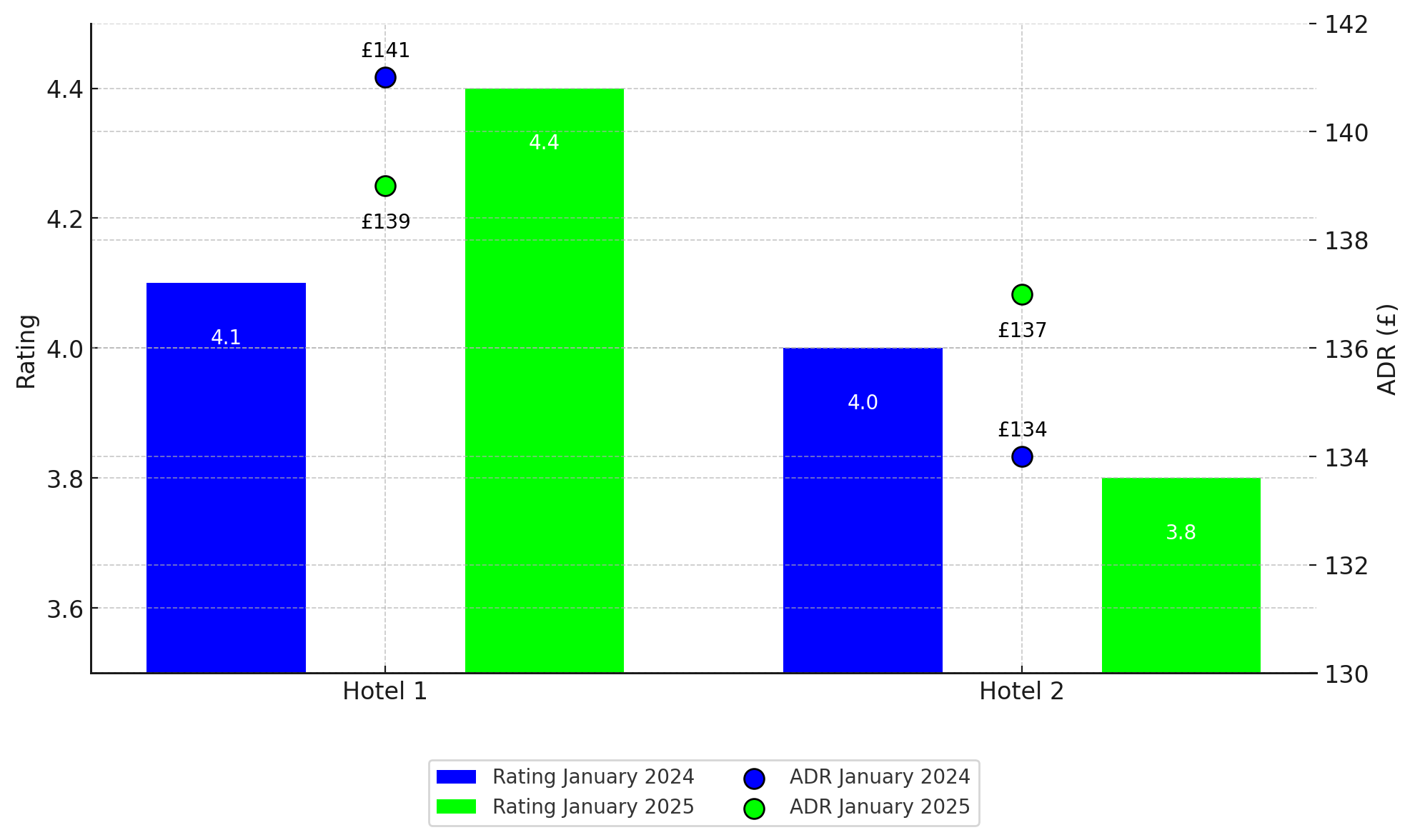No one likes a bad review. But beyond hurt pride and constructive criticism, what is the real financial impact on a hotel? How much revenue could they be losing?
NB: This is an article from Aggregate Intelligence, one of our Expert Partners
Subscribe to our weekly newsletter and stay up to date
In this analysis, we examine two comparable hotels in Southampton, United Kingdom. These hotels are located less than a mile apart, both have a 4-star rating, and offer similar facilities. However, one hotel maintains a higher average rating than the other—and we assess how this impacts revenue.
Review Scores and Room Prices (Table)

Review Scores vs. Room Prices (Graph)

Average Review vs. Room Price
In this scenario:
- In 2024, Hotel 1 had a score of 4.1, slightly higher than Hotel 2’s score of 4.0.
- With a 0.1 difference in score, Hotel 1 maintained a £5 higher average room rate compared to Hotel 2.
- In 2025, Hotel 1 increased its score to 4.4, while Hotel 2’s score dropped to 3.8.
- With a 0.6-point difference in rating, Hotel 1 still retained a £4 price premium.
The result: Hotel 1 experienced a significant uplift in reservations and occupancy. Despite maintaining a price advantage, Hotel 2 saw a notable decrease in reservations.
The Key Insight
By considering both pricing and review scores, Hotel 1 worked on enhancing its value proposition. Aiming for better reviews while maintaining competitive pricing, they succeeded in increasing perceived value. In contrast, Hotel 2 focused solely on pricing and missed the mark.
Financial Implications
- Hotel 1’s value-based strategy led to an additional £69,787.20* in revenue this month compared to the previous year.
- Hotel 2’s price-only strategy resulted in a loss of £27,900.00.
The Importance of Value
Value perception directly influences a guest’s willingness to pay and their booking decisions. As shown in this case, Hotel 1 attracted more guests – even at a premium – because it offered better perceived value. When guests believe they’re getting more (better amenities, service, cleanliness, or overall experience), they become less price-sensitive and more inclined to choose that hotel.
The Importance of Customer Reviews and Scores
Reviews are a critical quality indicator in the hospitality industry. This case demonstrates that even a modest increase in review scores (from 4.1 to 4.4) can have a significant impact on reservations and occupancy. Meanwhile, a decline in Hotel 2’s rating (from 4.0 to 3.8) led to reduced bookings despite lower prices. This highlights that guests often prioritize quality over minor cost savings.
Strategic Application of Review Data
Hotels that effectively leverage review and sentiment analysis can apply the insights across multiple teams:
- Marketing Teams use positive reviews in promotional materials and encourage guest feedback.
- Customer Service Teams focus on key areas for improvement such as friendliness or responsiveness.
- Revenue Management teams use review data to optimize pricing strategies and maintain a competitive edge.
How Aggregate Intelligence Supports Review Analysis
Solutions provided by Aggregate Intelligence help Travel Tech companies and Hotels:
- Monitor review trends to identify strengths and areas for improvement.
- Analyze competitor reviews to benchmark performance and stay competitive.
- Implement data-driven strategies to improve both guest satisfaction and financial performance.
If you would like to try our data, get in contact us with us today. *Calculated by comparing year-on-year increases in both occupancy and average daily rate, driven by the hotel’s improved review score and perceived value.





